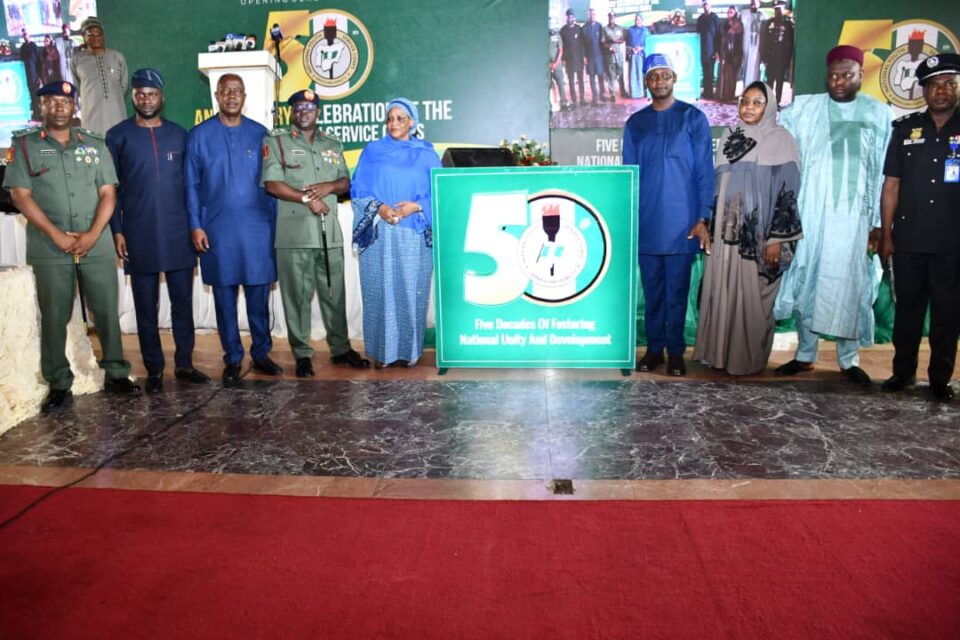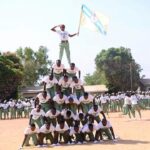By Godwin Onuh Odeh
Recall that Decree No. 24 of 22nd May 1973, which repelled the Decree No. 51 of 16th June 1993, later amended as NYSC ACT CAP N84 Laws of the Federation 2004 established the NYSC. The aim is to attempt a historical reminiscences of the scheme national leadership of the scheme. The table below would go a long way in reducing this knotty task.
Table 1: Chronicle of NYSC National Directorate Leadership, 1973-2023
S/NO
NAMES
TENURE/YEAR
1
Col. A A Ali
1973-1975
2
Col. S K. Omojokun
1975-1979
3
Col. P K.Obasa
1979-1983
4
Col. EA.Akpan
1983-1987
5
Col. A Braimoh
1988-1990
6
Brig. Gen. H B. Momoh
1990-1994
7
Brig. Gen. S A. Sofoluwe
1994-1996
8
Col.later Brig.Gen. S M.Dule
1996-1999
9
Brig.Gen. K O. Ogunkoya
1999-2000 & 2000-2002
10
Rev. P O. Okunromade
2002-2002
11
Police Com. S I. Ewokan
2002-2002
12
Brig.Gen. W. Oki
2002-2004
13
Brig. Gen. Y. Bomoi
2004-2009
14
Brig.Gen. M I.Tsiga
2009-2011
15
Brig. N T.Okorie-Affia
2011-2014
16
Brig.Gen. J. Olawumi
2014-2016
17
Brig. Gen. S Z. Kazaure
2016-2019
18
Brig. Gen. later Maj. Gen S. Ibrahim
2019-2022
19
Brig. Gen. M. Fadah
2022-2022
20
Mrs. Christy Uba Acting DG
2022-2023
21
Brig. Gen. Ahmed Yeshua
2023-ongoing.
Source: G O. Odeh, Shuaibu Ibrahim: Iconic Years in NYSC, Makurdi: Aboki Publishers, 2022, p.13.
As could be seen from the table, the first to pioneer the national leadership of the scheme was Col. A A. Ali, then Director General. This was during regime of General Yakubu Gowon retired. About eight thousand, eight hundred and fifty seven (8, 857) corps members were mobilized for the years 1973/1974, 1974/1975 and 1975/1976 respectively and the head of State award winner for the period was thirty two corps members (32). The economy then was robust and there was no challenge of number of corps explosion as the number of degree awarding institutions was very minimal compared to today.
After Col. A A. Ali, came Col. S K. Omojokun during the regime of General Murtala Mohammed/ Olusegun Obasanjo regimes. The regime gave attention to the Scheme and identifies area where activities of the corps members would be required in line with the policy drive of the military government particularly the Operation Feed the Nation Programme and the Cooperative Movement. No significant policy adjustment was made to actualize the above aim. However, the regime was able to cope with upsurges in the number of corps participants due to the increased number of institutions especially universities from six in 1973, to thirteen in 1979. This was due to the amendment of NYSC enabling Act in 1974 and 1975 which permits mobilization of National Certificate of Education (NCE) and Higher National Diploma (HND. It was a golden years following increased number of corps members. Thirty two thousand, five hundred and fifty three (32,553) graduates were mobilized and fifty seven (57) head of state’s award winners.
Col. Obasa ‘s tenure followed Omojokun. Col. Obasa was the main man who manages the affairs of the Scheme during this period, though some record shows Omojokun and Akpan’s tenure intervening as indicated in the table above. It was during this period that NYSC’s public image was badly battered leading to the jailing of Director General Obasa. Seventy six corps members won President’s award and while the number of corps mobilization continue to grow exponentially.
Col. Akpan that took over came to inherit a seriously damaged image of the Scheme, with a difficult task of building and regaining the lost public confidence on NYSC. Number of corps participants during the regime stood at ninety one thousand, five hundred twenty two (91,522) corps members, while number of award winners was forty corps members.
Col. Braimoh oversees NYSC after Akpan. One of the outstanding achievements under Braimoh was the relocation of NYSC National Directorate Headquarters from Lagos to Abuja, the new Federal Capital Territory during President Ibrahim Babangida.
Consequently, under Brigadier Momoh, the scheme was to experience fundamental changes. Most profound among the changes was the promulgation of Decree 51 of 16th June 1993 that repealed NYSC Act Decree No. 24 of the 22nd of May, 1973, which is now NYSC Act CAP84 Laws of the Federation of Nigeria since 2004. The Act and the amendment of the previous ones revolutionized the Scheme. A total of two hundred and thirty six thousands, three hundred and eighty eight (236, 388) graduates were mobilized during his tenure, while one hundred eighty emerged as president’s honour and award winners. Of all the military heads, IBB appeared to be the best for the scheme.
Momoh’s transfomatory leadership tenure extended to Brigadier Sofoluwe and Col. Dule’s years. Abacha recognizes the Scheme in the period in his observation that: “the National Youth Service Corps Scheme has undoubtedly become a household name in Nigeria” and he further avers, thus:
Twenty one years after the establishment of the National Youth Service Scheme in Nigeria, the course of our national experience continues to reinforce the relevance of its conception in our effort at nation building. Our resolve and commitment and resolve as a government to support the Corps and strengthen its programmes remain as strong as ever.
In short, the transformational leadership style demonstrated by Momoh was lacking in Sofoluwe and Dule, probably due to individual differences. The hoisting of the Second Global Youth Conference of the National Youth Service in Abuja, between 10th and 15th, October, 1994 was momentous in the years and also, the NYSC technical assistance to The Gambia
The epic return of the nation to civil rule in 1999 to had created leadership inconsistencies affecting the engagement of the scheme. This is visible in the appointment of Brigadier Ogunkoya, Police Commissioner Emakaro and Reverend Okunromade in a very quick succession. In fact, Ogunokya’s stays was mired and marred by financial regulatory problems, which the Scheme began to recover and enjoy leadership stability with the appointment of Brigadier Oki and Bomoi. It was during this period the amendment of Decree No. 51 of 16th June 1993, now known as NYSC ACT CAP N84 Laws of the Federation since 2004 was made. Bomoi’s tenure added flavor to Obasanjo second tenure (May 29, 2003 to May 29, 2007) giving his pragmatic leadership. Almost all NYSC moribund programmes were reactivated during this period. It was at this time NYSC was moved to its headquarters plot in “Yakubu Gowon House” Maitama, Abuja. The Scheme continued to experienced increase number of participants and award winners.
It may be interesting to note that except Brigadier General Shuaibu Ibrahim, successive Director General that followed such as Brigadier General M. I. Tsiga, N T. Okrie-Affia, J. Olawumi and even, S. Z. Kazuare built on the good legacies of Yusuf Bomoi.
Shuaibu Ibrahim tenure started on a brighter note of reactivating the hitherto laws and Acts that appeared to have gone comatose. Evidence gleaned from core and thematic areas such as General Information, Youth Mobilization for Nation Building, Community Development Service and Rural Development, Language Studies, Health Education and Services, Social Education, Programme Evaluation, Scheme Appraisal, among others, stand the Major General Shuaibu Ibrahim’s years out. His ability to manage the scheme in the face of dreadful Covid-19 pandemic added another tonic to NYSC story at fifty. He initiated and was captured in over 45 development strides within just two years in office. The initial opinions were that he may at the end be compared to the much celebrated Col. Akpan and Momoh, but adjudged to have surpassed them. To historians, Ibrahim’s years remained the golden age in the development of NYSC historiography, for never in the history of the scheme has so much number of work been published on the scheme like it was under Shuaibu.
The stellar performance of Shuaibu appeared to have made Brigadier General M. Fada to have stepped into a very shoes as much was expected of him by the staff, corps members, stakeholders and the general public giving the leadership standard his predecessor set and left. Brigadier Fada who took over in May 2022 was fired in November 2022 on the ground of gross incompetence due to adamancy to learn. The sack of Brigadier Fada paved way for Mrs. Christy Uba, the first female and first career staff to have emerged as Director General of NYSC, though in acting capacity. Mrs. Uba with a lot of administrative experience manages affairs of the Scheme till the appointment and assumption of office by Brigadier General Ahmed Yeshua, on the 30th of January 2023. As an erstwhile Military Assistant, he is considered to have come to a familiar terrain unlike Fada, who knows nothing about the workings of the NYSC. Brigadier Yeshua’s comportment and organizational skills and human relations point to the fact that he would be able to sustains the NYSC and take it to greater height as he promised upon assumption of office.
*Dr. Odeh, Senior Lecturer, Specialist in NYSC History and Youth Studies, Department of History, Sokoto State University, Sokoto-Nigeria.



